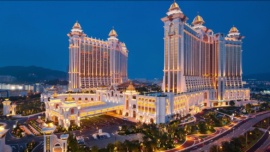When questioned about a potential lack of future human resources in Information Technology (IT) the Vice President of the Science and Technology Council of the SAR, Jose Chui Sai Peng, told Business Daily that the main purpose of holding this yearly exhibition is “precisely to encourage more young people to follow the scientific and IT life [rather] than going into some other industry in Macau.” He made the comment on the sidelines of the opening ceremony of Science and Technology Week.
In a push to promote and exhibit technological innovations to motivate local students to pursue careers in information technology (IT), the Science and Technology Council organises the annual Science and Technology Week, which this year is in collaboration with the China Science and Technology Centre and the Macau Science and Technology Fund (FDCT).
The event, which debuted in 2007, runs until July 10 and takes place at the Macao Fisherman’s Wharf Convention Centre, assembling 39 teams from local universities, schools and science associations, with eight companies and universities from Mainland China. According to the organisers an estimated 120,00 visitors to the event are expected over the three-day period.
Incentives
Beneficiaries of last year’s FDCT Science Popularisation subsidy received a total of MOP585,000 (US$73,209) in subsidies from 39 local representatives. This financial support provides learning institutions with a MOP15,000 subsidy for a scientific project developed by the institution’s students.
In 2015, the FDCT awarded MOP113 million for 86 scientific investigation projects, with the University of Macau the largest beneficiary – receiving 67.2 per cent of the funding.
“The total population of Macau is small and we haven’t developed the business or IT sector a lot. We hope that when they finish the course these young people will go into the IT sector instead of the finance or tourism sector. Money is important but exposure is, too. By exposing them to these innovations, like VR [virtual reality] they will be interested in these fields,” Jose Chui told Business Daily.
“This is all to motivate students to create useful technologies [to help develop] the economy in Macau. Maybe one day people here will be able to gamble on some of the robot horses one of our student groups has developed,” Paulo Cheang member of the FDCT Administrative Committee, told Business Daily.
Virtual or real support?
Local Virtual Reality company Real Slim Computer Co. Ltd. was one of the only local startups attending the event, after receiving a payment of over MOP15,000 from the Macao Science Centre to develop VR technology for the event.
“I don’t think there’s enough support in Macau for tech startups. The Macao Science Centre was the only institution we found willing to invest in our VR technology,” Kevin Kuok, engineer at Real Slim told Business Daily.
Terry Lok, an e-commerce student from the Macau Polytechnic Institute (IPM) that helped develop an app that reveals empty spaces in parking lots, points out that the problem comes down to the usual monetary concerns.
“Most students think that to develop technology in Macau you need a lot of money and they don’t think that they can find investors or make a lot of profit in the city,” Lok told Business Daily.
For Kou Yuan, a system engineer at Beijing Peeny Electronic Group that developed a Formula 1 4D simulator, Science Week is a good opportunity to find companies willing to invest in the company’s product.
“To build the car we produce the components all over China, but after the Macau Government invited us we decided to expose the product here,” Kou told Business Daily.























